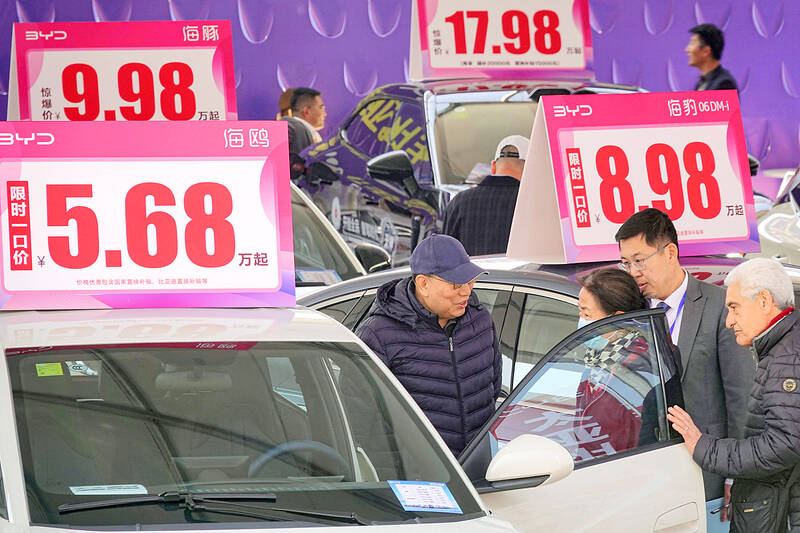A top industry group last week gave a stern rebuke to automakers fueling a “price war,” a week after Chinese electric vehicle (EV) giant BYD Co (比亞迪) announced sweeping trade-in discounts, with multiple competitors following suit.
“Since May 23, a certain automaker has taken the lead in launching a substantial price drop campaign ... triggering a new round of ‘price war’ panic,” the China Association of Automobile Manufacturers (CAAM) said in a statement posted to its WeChat account.
Such “disorderly” competition would “exacerbate harmful rivalry” and harm profit, the group said.

Photo: AFP
The statement, dated on Friday, did not single out any company by name, but on May 23, BYD announced it was offering big trade-in discounts on nearly two dozen makes, offering discounts of up to 34 percent.
Its cheapest model, the Seagull, now goes for a starting price of 55,800 yuan (US$7,745), down from 69,800 yuan, with a trade-in.
Days later, Stellantis NV-backed Chinese EV start-up Leapmotor Technology Ltd (零跑汽車) announced similar discounts on two “entry-level” models through Sunday.
Geely Automobile Holdings Ltd (吉利汽車) on Friday announced limited-time trade-in subsidies for 10 models, with its X3 Pro going for the lowest starting price of 44,900 yuan.
However, domestic criticism was growing against what the automakers association called “involution” — a popular tag used to describe the race to outcompete that ends up nowhere.
Wei Jianjun (魏建軍), CEO of China’s Great Wall Motor Co (長城汽車), whose annual revenue was about one-quarter of BYD’s, compared it to the start of China’s years-long housing slump triggered by the 2021 default of property giant Evergrande Group (恆大集團).
“Evergrande in the auto industry already exists,” Wei said in an interview with Chinese news outlet Sina Finance last month. “I hope that ... all these years of hard work will not go to waste.”
Beijing has poured vast state funds into the EV sector, supporting the development and production of less polluting battery-powered vehicles.
However, China’s automakers association warned its goliaths to play fair.
“Leading companies must not monopolize the market,” the CAAM statement said.
It added that “with the exception of lawful discounting, companies must not sell products below cost nor engage in misleading advertising.”
Such behavior disrupted the market and harmed consumers and the industry, it said.
BYD Co’s sales last month were its best this year after heavy discounts offered during the final days of the month lured customers into showrooms.
The company sold 382,476 vehicles last month, according to a statement yesterday. Of those, passenger cars were 376,930. Notably, BYD’s battery passenger EV sales of 204,369 topped its plug-in hybrid sales of 172,561, only the second time pure EV sales have been in front since early last year.
Analysts at Citi Research estimated that after BYD’s discounts, traffic to its dealerships may have surged between 30 percent and 40 percent week-on-week.
Year-to-date, BYD has sold 1.76 million units. Its target for the full year is 5.5 million.
Additional reporting by Bloomberg

Sweeping policy changes under US Secretary of Health and Human Services Robert F. Kennedy Jr are having a chilling effect on vaccine makers as anti-vaccine rhetoric has turned into concrete changes in inoculation schedules and recommendations, investors and executives said. The administration of US President Donald Trump has in the past year upended vaccine recommendations, with the country last month ending its longstanding guidance that all children receive inoculations against flu, hepatitis A and other diseases. The unprecedented changes have led to diminished vaccine usage, hurt the investment case for some biotechs, and created a drag that would likely dent revenues and

Macronix International Co (旺宏), the world’s biggest NOR flash memory supplier, yesterday said it would spend NT$22 billion (US$699.1 million) on capacity expansion this year to increase its production of mid-to-low-density memory chips as the world’s major memorychip suppliers are phasing out the market. The company said its planned capital expenditures are about 11 times higher than the NT$1.8 billion it spent on new facilities and equipment last year. A majority of this year’s outlay would be allocated to step up capacity of multi-level cell (MLC) NAND flash memory chips, which are used in embedded multimedia cards (eMMC), a managed

CULPRITS: Factors that affected the slip included falling global crude oil prices, wait-and-see consumer attitudes due to US tariffs and a different Lunar New Year holiday schedule Taiwan’s retail sales ended a nine-year growth streak last year, slipping 0.2 percent from a year earlier as uncertainty over US tariff policies affected demand for durable goods, data released on Friday by the Ministry of Economic Affairs showed. Last year’s retail sales totaled NT$4.84 trillion (US$153.27 billion), down about NT$9.5 billion, or 0.2 percent, from 2024. Despite the decline, the figure was still the second-highest annual sales total on record. Ministry statistics department deputy head Chen Yu-fang (陳玉芳) said sales of cars, motorcycles and related products, which accounted for 17.4 percent of total retail rales last year, fell NT$68.1 billion, or

In the wake of strong global demand for AI applications, Taiwan’s export-oriented economy accelerated with the composite index of economic indicators flashing the first “red” light in December for one year, indicating the economy is in booming mode, the National Development Council (NDC) said yesterday. Moreover, the index of leading indicators, which gauges the potential state of the economy over the next six months, also moved higher in December amid growing optimism over the outlook, the NDC said. In December, the index of economic indicators rose one point from a month earlier to 38, at the lower end of the “red” light.